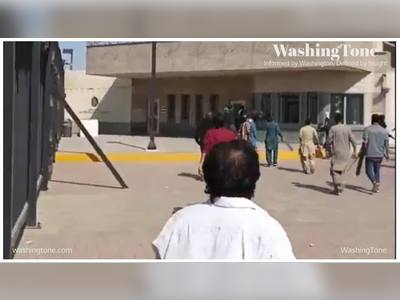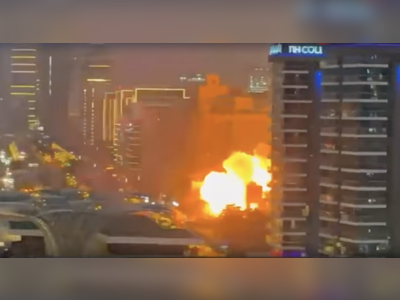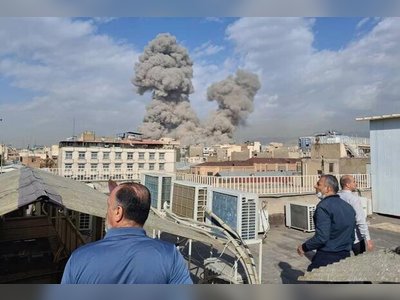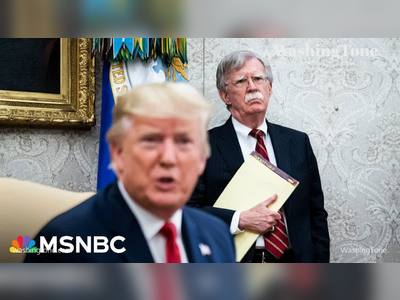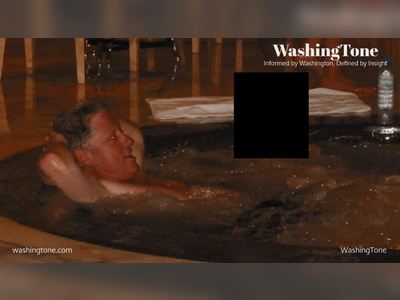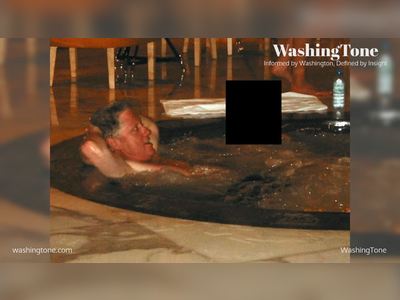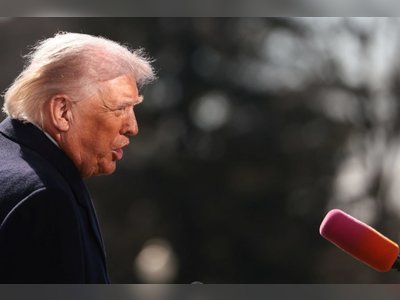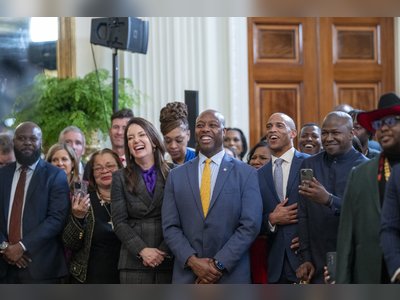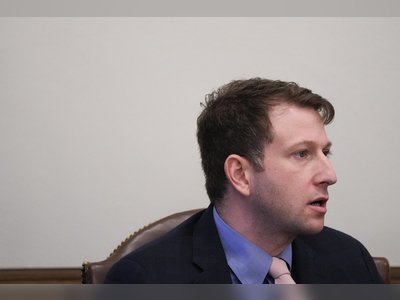White HouseSenateThe HouseSupreme CourtFederal ReserveDOJState DepartmentTreasuryCensusBudget OfficeTrade Representative
WashingTone
Informed by Washington, Defined by Insight
Monday, Mar 02, 2026
WashingTone

U.S. Targets Venezuelan Officials in Latest Sanctions to Counter Maduro’s Repression
The U.S. intensifies pressure on Venezuelan officials backing Nicolás Maduro’s regime, with coordinated sanctions aimed at halting human rights abuses and fostering democratic transition.
WASHINGTON — In an effort to increase diplomatic pressure on Nicolás Maduro’s embattled regime, the U.S. Department of the Treasury’s Office of Foreign Assets Control (OFAC) has imposed sanctions on eight key Venezuelan officials accused of enabling Maduro’s continued repression of political opposition and democratic subversion.
These actions, part of a coordinated international effort involving Canada, the European Union, and the United Kingdom, aim to curb the Venezuelan government's systemic human rights abuses and obstruct its access to vital financial resources.
Sanctions Against Maduro's Inner Circle
Among those sanctioned are several high-ranking officials from Venezuela’s state-owned entities and military institutions.
The most significant of these is Hector Andres Obregon Perez, the president of Petroleos de Venezuela, S.A. (PdVSA), Venezuela’s state-run oil giant, and the nation’s primary source of revenue.
PdVSA has been under U.S. sanctions since 2019, but the U.S. government’s move to target Obregon directly demonstrates a renewed commitment to strangling the financial lifelines that sustain the Maduro regime.
As the president of PdVSA, Obregon is seen as a central figure in maintaining Venezuela’s oil exports, which have been a primary source of foreign currency for the government.
Also sanctioned was Ramon Celestino Velasquez Araguayan, Maduro’s Minister of Transportation and president of the state-owned Venezuelan Consortium of Aeronautical Industries and Air Services (CONVIASA), which has faced sanctions for its role in supporting Maduro's regime.
Velasquez has overseen operations that have been involved in human rights violations, including the blocking of democratic opposition voices in Venezuela.
These actions reflect the U.S. government's strategy to apply pressure to officials who are directly responsible for maintaining the repressive state apparatus.
The U.S. sanctions extend beyond economic figures to include military and police officials, many of whom are accused of leading efforts to undermine democratic processes and perpetuate the violence used against Venezuelan protesters.
For example, Douglas Arnoldo Rico Gonzalez, the director of the Scientific, Penal, and Criminal Investigations Corps (CICPC), and Danny Ramon Ferrer Sandrea, vice minister of the Integrated System of Penal Investigations, have both been implicated in carrying out extrajudicial killings and arbitrary arrests of political dissidents.
The Continued Repression of the Venezuelan People
The sanctions come in the wake of Venezuela’s presidential elections on July 28, 2024, which were marred by widespread allegations of fraud and manipulation.
The U.S. and its allies have condemned the elections as neither free nor fair, with Maduro continuing to use the state’s repressive machinery to maintain control.
As part of this crackdown, Venezuela has witnessed an ongoing pattern of violence against opposition groups, including the killing of protesters and the forced exile of political leaders.
“Since last year’s election, Maduro and his associates have continued their repressive actions in Venezuela,” stated Acting Under Secretary of the Treasury for Terrorism and Financial Intelligence Bradley T.
Smith.
“The United States, together with our likeminded partners, stands in solidarity with the Venezuelan people’s vote for new leadership and rejects Maduro’s fraudulent claim of victory.” The U.S. government’s stance underscores its rejection of Maduro’s hold on power and highlights a commitment to supporting Venezuela’s transition to democracy.
The Venezuelan regime’s ongoing human rights violations have drawn sharp condemnation from international organizations, with the U.S. pledging to continue its pressure on Maduro until free and fair elections are held.
In parallel, the U.S. State Department has increased reward offers of up to $25 million for information leading to the arrest and conviction of key figures such as Maduro and Diosdado Cabello, Maduro’s Minister of Interior, Justice, and Peace.
Multilateral Support and Global Pressure
The sanctions against Venezuelan officials were coordinated with several international partners, including Canada, the European Union, and the United Kingdom, signaling a unified international stance against Maduro’s autocratic governance.
These actions are part of a larger strategy to isolate Venezuela’s leadership from the global financial system, making it increasingly difficult for the regime to access funds to sustain its repressive policies.
The European Union and the U.K. have separately imposed similar sanctions against Venezuelan officials, with a focus on those directly involved in election manipulation and the suppression of peaceful protests.
These multilateral actions reflect a growing global consensus that Venezuela’s government must be held accountable for its violations of human rights and democratic norms.
The Broader Implications of Sanctions
The broader implications of these sanctions are far-reaching.
For one, they serve as a deterrent to other regimes that may seek to undermine democracy and violate human rights without facing consequences.
By targeting Venezuela’s oil sector, the U.S. and its allies aim to limit the regime's access to resources that it uses to fund its military and police forces, thus constraining the Maduro regime’s ability to maintain its hold on power.
However, these sanctions come with risks.
While they exert pressure on Maduro and his allies, they also contribute to the further isolation of the Venezuelan people, who are already grappling with severe economic hardships, including hyperinflation, food scarcity, and a lack of basic public services.
Humanitarian organizations have raised concerns that the sanctions may inadvertently harm ordinary Venezuelans, even as they strive to diminish the power of a repressive government.
To mitigate these risks, the U.S. has made provisions for humanitarian exceptions, allowing for the continued flow of aid to Venezuela’s suffering population.
Furthermore, the U.S. government maintains that the ultimate goal of sanctions is not to punish, but to drive a positive change in behavior by encouraging a transition to democratic governance.
Conclusion: A Steady Pressure Campaign
In conclusion, the sanctions imposed today are part of a long-standing U.S. strategy to exert pressure on Venezuela’s autocratic regime.
By targeting high-ranking officials responsible for repression, the U.S. and its allies send a message that the international community will not tolerate human rights abuses and election fraud.
While the long-term effects of these measures remain uncertain, they reflect a commitment to supporting the Venezuelan people’s aspirations for democracy and human dignity.
The U.S. will likely continue to face challenges as it seeks to navigate the complexities of international relations, human rights, and economic stability.
However, these sanctions reinforce a clear stance against undemocratic practices, signaling that the global community is committed to standing in solidarity with Venezuela’s fight for a democratic future.
These actions, part of a coordinated international effort involving Canada, the European Union, and the United Kingdom, aim to curb the Venezuelan government's systemic human rights abuses and obstruct its access to vital financial resources.
Sanctions Against Maduro's Inner Circle
Among those sanctioned are several high-ranking officials from Venezuela’s state-owned entities and military institutions.
The most significant of these is Hector Andres Obregon Perez, the president of Petroleos de Venezuela, S.A. (PdVSA), Venezuela’s state-run oil giant, and the nation’s primary source of revenue.
PdVSA has been under U.S. sanctions since 2019, but the U.S. government’s move to target Obregon directly demonstrates a renewed commitment to strangling the financial lifelines that sustain the Maduro regime.
As the president of PdVSA, Obregon is seen as a central figure in maintaining Venezuela’s oil exports, which have been a primary source of foreign currency for the government.
Also sanctioned was Ramon Celestino Velasquez Araguayan, Maduro’s Minister of Transportation and president of the state-owned Venezuelan Consortium of Aeronautical Industries and Air Services (CONVIASA), which has faced sanctions for its role in supporting Maduro's regime.
Velasquez has overseen operations that have been involved in human rights violations, including the blocking of democratic opposition voices in Venezuela.
These actions reflect the U.S. government's strategy to apply pressure to officials who are directly responsible for maintaining the repressive state apparatus.
The U.S. sanctions extend beyond economic figures to include military and police officials, many of whom are accused of leading efforts to undermine democratic processes and perpetuate the violence used against Venezuelan protesters.
For example, Douglas Arnoldo Rico Gonzalez, the director of the Scientific, Penal, and Criminal Investigations Corps (CICPC), and Danny Ramon Ferrer Sandrea, vice minister of the Integrated System of Penal Investigations, have both been implicated in carrying out extrajudicial killings and arbitrary arrests of political dissidents.
The Continued Repression of the Venezuelan People
The sanctions come in the wake of Venezuela’s presidential elections on July 28, 2024, which were marred by widespread allegations of fraud and manipulation.
The U.S. and its allies have condemned the elections as neither free nor fair, with Maduro continuing to use the state’s repressive machinery to maintain control.
As part of this crackdown, Venezuela has witnessed an ongoing pattern of violence against opposition groups, including the killing of protesters and the forced exile of political leaders.
“Since last year’s election, Maduro and his associates have continued their repressive actions in Venezuela,” stated Acting Under Secretary of the Treasury for Terrorism and Financial Intelligence Bradley T.
Smith.
“The United States, together with our likeminded partners, stands in solidarity with the Venezuelan people’s vote for new leadership and rejects Maduro’s fraudulent claim of victory.” The U.S. government’s stance underscores its rejection of Maduro’s hold on power and highlights a commitment to supporting Venezuela’s transition to democracy.
The Venezuelan regime’s ongoing human rights violations have drawn sharp condemnation from international organizations, with the U.S. pledging to continue its pressure on Maduro until free and fair elections are held.
In parallel, the U.S. State Department has increased reward offers of up to $25 million for information leading to the arrest and conviction of key figures such as Maduro and Diosdado Cabello, Maduro’s Minister of Interior, Justice, and Peace.
Multilateral Support and Global Pressure
The sanctions against Venezuelan officials were coordinated with several international partners, including Canada, the European Union, and the United Kingdom, signaling a unified international stance against Maduro’s autocratic governance.
These actions are part of a larger strategy to isolate Venezuela’s leadership from the global financial system, making it increasingly difficult for the regime to access funds to sustain its repressive policies.
The European Union and the U.K. have separately imposed similar sanctions against Venezuelan officials, with a focus on those directly involved in election manipulation and the suppression of peaceful protests.
These multilateral actions reflect a growing global consensus that Venezuela’s government must be held accountable for its violations of human rights and democratic norms.
The Broader Implications of Sanctions
The broader implications of these sanctions are far-reaching.
For one, they serve as a deterrent to other regimes that may seek to undermine democracy and violate human rights without facing consequences.
By targeting Venezuela’s oil sector, the U.S. and its allies aim to limit the regime's access to resources that it uses to fund its military and police forces, thus constraining the Maduro regime’s ability to maintain its hold on power.
However, these sanctions come with risks.
While they exert pressure on Maduro and his allies, they also contribute to the further isolation of the Venezuelan people, who are already grappling with severe economic hardships, including hyperinflation, food scarcity, and a lack of basic public services.
Humanitarian organizations have raised concerns that the sanctions may inadvertently harm ordinary Venezuelans, even as they strive to diminish the power of a repressive government.
To mitigate these risks, the U.S. has made provisions for humanitarian exceptions, allowing for the continued flow of aid to Venezuela’s suffering population.
Furthermore, the U.S. government maintains that the ultimate goal of sanctions is not to punish, but to drive a positive change in behavior by encouraging a transition to democratic governance.
Conclusion: A Steady Pressure Campaign
In conclusion, the sanctions imposed today are part of a long-standing U.S. strategy to exert pressure on Venezuela’s autocratic regime.
By targeting high-ranking officials responsible for repression, the U.S. and its allies send a message that the international community will not tolerate human rights abuses and election fraud.
While the long-term effects of these measures remain uncertain, they reflect a commitment to supporting the Venezuelan people’s aspirations for democracy and human dignity.
The U.S. will likely continue to face challenges as it seeks to navigate the complexities of international relations, human rights, and economic stability.
However, these sanctions reinforce a clear stance against undemocratic practices, signaling that the global community is committed to standing in solidarity with Venezuela’s fight for a democratic future.
